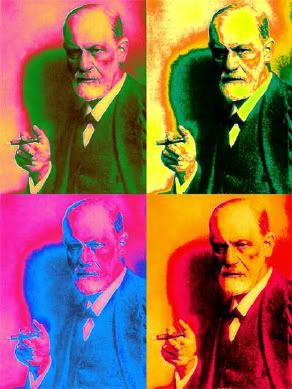
Happy Birthday May 6th to the man who made postmodernism possible. I discovered Freud for real in graduate school, in the wake of Juliet Mitchell's reclamation of Freud for feminism, and feminism's reclamation of Freud for Lacan. I've been trying to teach him to skeptical undergraduates ever since. The really amazing thing about Freud is that he tried to listen to women and he took women on as students in an era in which such things were marvelous. He laid the groundwork for the critique of so-called "normal" heterosexuality, showing that almost nobody isn't sexually queer in some way, and outlining in painstaking detail the difficult road children must take as they try to assume the burdens of gendered subjects. He found reluctance, nostalgia, sadness, deflection, self-sacrifice, loyalty, loathing, and courage in every form of human attachment. His writing is often fair and kind, and the mind revealed in his work is one genuinely moved by all kinds of people.
One of my favorite Freud moments occurs is his essay about Leonardo da Vinci and sublimation, Leonardo da Vinci and a Memory of His Childhood. Positing that Leonardo's attraction to his own mother was the source of his homosexuality, Freud attempts to account for Leonardo's artistic output and scientific curiousity by theorizing that Leonardo literally transformed his homosexual impulses into art and research. Noting the playfulness of Leonardo's mind, Freud writes:
"Indeed, the great Leonardo remained like a child for the whole of his life in more than one way; it is said that all great men are bound to retain some infantile part. Even as an adult he continued to play, and this was another reason why he often appeared uncanny and incomprehensible to his contemporaries. It is only we who are unsatisfied that he should have constructed the most elaborate mechanical toys for court festivities and ceremonial receptions, for we are reluctant to see the artist turning his power to such trifles.
. . .It is probable that Leonardo's play-instinct vanished in his maturer years, and that it too found its way into the activity of research which represented the latest and highest expansion of his personality. But its long duration can teach us how slowly anyone tears himself from his childhood if in his childhood days he has enjoyed the highest erotic bliss, which is never again attained."
The wistfulness of this passage always gets me--the appreciation of the innate playfulness and creativity in everyone, the ominous sense of the world ready to crush that creativity and replace it with the gravitas of respectability, the longing of the Freud who comes through in this brief moment as a man trapped by adulthood, a prisoner gazing back at the bright patch of sunshine receding from him, as childhood recedes from us all.
5 comments:
indeed, indeed, just as it recedes from children themselves . . .
I didn't know it was Freud's birthday! I love Freud, and I teach him to my undergrads, too... and that "wistfulness" that you talk about is present in so much of his work.
And pretty much founded semiotics.
I must admit, I love reading Freud. He tells you so much about culture and he's a great writer too.
What a way to describe Freud coming to terms with the coming (or going) of age. I enjoyed it.
If only Freud, or da Vinci, had a blog. Of course, "they" might. I haven't searched ;)
Very nice post. I enjoy your writing. Greetings from yet another person who likes to read Freud.
Post a Comment